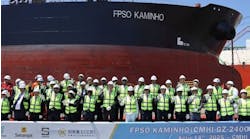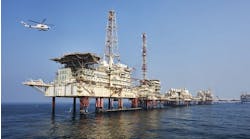ACCOMMODATION MODULES: Norway’s development revival putting pressure on specialist fabricators
Demand for offshore living quarters has risen markedly in the Norwegian sector, potentially straining the supply capacity of this specialist sector. “When we were looking at market prospects 18 months ago, we were concerned that the North Sea was dead,” says Klas Wallin, marketing and sales manager at Emtunga. “Now we see up to five huge contracts in prospect in the Norwegian sector, all of which are likely to be placed by mid-2007.”
Statoil is responsible for three of these assignments: an additional quarters module for Snorre A, an extension to the Troll A accommodation, and a new quarters module for the Gjøa development. In addition BP requires a quarters module for the Valhall redevelopment project, and ConocoPhillips plans a large new hotel platform for Ekofisk. So field redevelopment and extension projects are really driving the market in Norway - the only greenfield development among these projects is Gjøa.
Contracts for Snorre A and Ekofisk 2/4 L were awarded earlier this year to another supplier, the Ekofisk job being in the form of a front-end engineering design (FEED) contract, with fabrication as an option. Bids for Valhall are expected to be invited during the fall - this module will weigh about 2,200 metric tons with around 150 single cabins and floor space of some 5,000 sq m. The contract may also include the electrical instrument module, part of the power-from shore system which BP plans to implement on Valhall.
The Troll A extension relates to a new development phase which would increase gas production significantly. Statoil plans to hang two buildings from the existing accommodation block. These will have a total floor area of around 4,000 sq m and will include other utilities as well as accommodation. Again, bids are expected in the fall.
The Gjøa enquiry is not expected until early 2007. This will be a module with about 100 single cabins, to be installed on a new semi-submersible production platform - similar to the 2,100-metric ton Kristin quarters, which Emtunga built and delivered in 2004.
Emtunga is the only foreign quarters supplier, Wallin says, that has delivered modules in accordance with the Norsok regulations that cover design and fabrication of offshore structures in Norway. Norway itself has one specialized quarters fabricator, and both that yard and Emtunga have other orders currently to deal with. Following the decline in new activity in the North Sea in recent years, Emtunga in particular has been successful in winning work on the global market.
There is an increasing requirement for aluminum in the upcoming Norwegian sector orders - not surprising in the case of additional modules, where it is vital to restrict the weight to the minimum possible. But Norway also pioneered the use of aluminum in accommodation modules, and has the regulatory framework for it, so aluminum often forms part of the requirement for newbuild platforms. Emtunga will expand its experience in working with aluminum, Wallin says.
In common with the offshore sector as a whole, living quarters suppliers are struggling to recruit skilled personnel. Many Swedish engineers with appropriate qualifications have taken up positions in Norway, which is experiencing an offshore development boom.
Pemex project
Emtunga is also well advanced with its first delivery to Pemex, which involves the replacement of two existing living quarter platforms as part of the Ku-Maloob-Zaap project in the Bay of Campeche. The main party to the contract is Bay Inelectra, which is building the jackets for the new platforms.
Emtunga has designed and built two identical modules, each weighing around 2,000 metric tons and accommodating 240 men in four-man cabins. The modules, which were built in sections at the company’s production plant in Gothenburg, were shipped to Bay Inelectra’s fabrication site in Tampico this summer. Emtunga was also responsible for hooking up the quarters once they had been assembled on the main deck frame. Offshore installation was due to take place this summer.
The company sees good prospects for winning further work in the Mexican sector. More tenders are coming up, and Pemex has been pleased with its performance on the current job, Wallin says.
This summer the company also shipped sections for a 1,500-metric ton module housing 180 beds in two-man cabins for PTT-EP’s Arthit project in Thailand. When the module has been assembled at a local yard, Emtunga will perform hook-up.
Another current assignment is a 60-bed living quarters for the ExxonMobil/Qatar LNG regasification plant which will be installed in the Adriatic Sea. This is a 1,500-metric ton structure, also incorporating a technical room, maintenance section and jetty control room. The safety specifications are unusually high, with extreme fire rating and blast loads. Delivery is scheduled for April 2007.
To win contracts on the world market often entails working with local suppliers, as Emtunga has done both in its Far East deliveries and in Mexico.
For more information contact Klas Wallin, Pharmadule Emtunga. Tel +46 31 794 1335, fax +46 31 546 856.[email protected]
Nick Terdre, Contributing Editor




